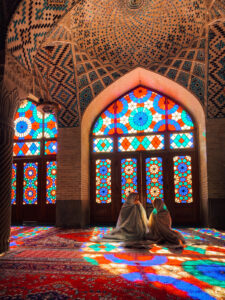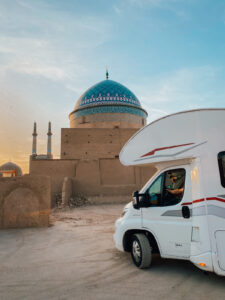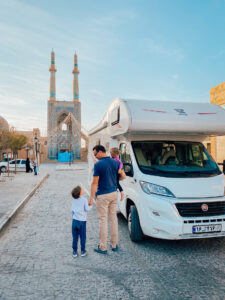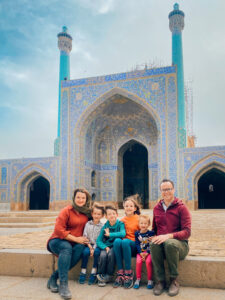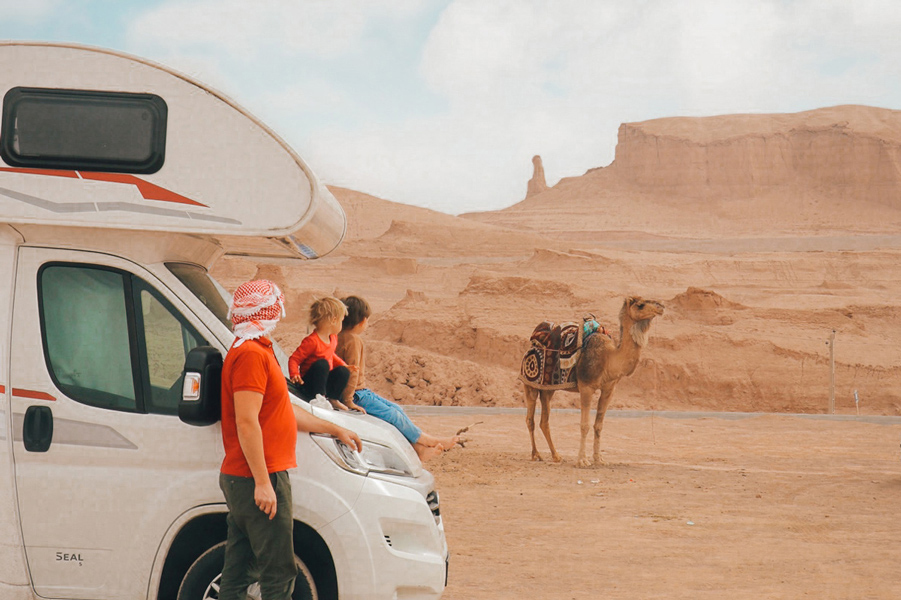
The family life ‘en plein air’. An interview with the Stoops
Three years on the road to adventure. The Stoops family talks about themselves.
Today marks the start of a new stage with our friends the Stoops @touristswithkids. This time with a twist–the four children are about to be joined by a fifth small and delightful addition. What will life be like with seven of them in their Rimor? And speaking of big numbers, we’ll be hearing about their latest trip from Luxembourg to Iran. Ready? Let’s hit the road!
Question: Let’s hit the ground running. You’ve made it all the way to Iran recently. What was it like to travel from Luxembourg to Iran?
It was amazing, we passed many countries with different cultures and habits on our way. The big advantage of the motorhome is, that you can stop anywhere you like and spend some time there. This was especially practical for us, when we discovered places without any infrastructure like hotels or restaurants. I remember we passed the best beach in Albania end of November. The touristic season was closed, so the beaches were completely empty and all the hotels closed. That week was a marvelous weather, so we decided to stay there for few days and enjoy the beaches for ourselves swimming in the sea and having a bbq at the beach. When I posted few photos on Instagram from our time at Ksamil beach, people couldn’t believe their eyes. We had all the beach for ourselves – it’s like being on the Eiffel Tower all by yourself. 🙂
But the weather conditions were not always that favorable on our way. We completely underestimated the geography of Turkey – the majority of the country is mountainous. When the news reported a cold wave in Turkey, that was the time when we were crossing the mountain passes of 2000m there. There was so much snow on the way that it was partially difficult to see. We were so grateful that we were traveling with the motorhome – we could stop in places, where we actually didn’t intend to and spend there some time until the snow storm stopped and we could safely continue driving. Sometimes it was only a break to cook lunch, another time we stayed overnight and woke up to stunning winter wonderland. We have all the comfort on board including heating, so we didn’t mind the temperatures of -15C outside.
Do living habits also change from one country to another while travelling in a motorhome which doubles as your actual home?
Absolutely. The climate has a big impact on our living habits. When the weather is warm, we spend most of the day outside. Therefore we usually go to the warmer destinations in the winter and to the mountains or the parts of Northern Europe in the summer time.
Also the cooking habits change. We shop locally and have to adapt to the eating habits of the available items in the country. This is for me the beauty of traveling, when you taste new food and discover the cuisine of the country. In Greece e.g. there were so many fisherman selling fresh fish and seafood straight out of the sea, so we ate a lot of fish when being there. Also we tasted all different kinds of feta cheese. The selection is giant, I never knew you can make feta in so many different tastes. In Turkey and Iran we shopped a lot at local bazaars, where most of the fruits and vegetables are fresh and regional. You absolutely do taste that. I have never tasted such delicious strawberries, peaches, tomatoes, oranges and watermelons.
When did you come up with the idea of living in a motorhome and travelling the world? And what made you choose Rimor?
3,5 years ago we realized that we were not happy about our lifestyle – we had the impression that we were missing out a lot in our lives and that life can be much more than just work and paying bills. We had the feeling of being trapped in a kind of rat-race spending too little time on things, that were truly important to us – being with our kids and being in the nature. We knew that our time with the children is limited, as they will grow up and leave the house one day and this day will come way too fast.. We wanted to travel and experience the world. We knew that waiting for the perfect moment is useless, as there is never THE perfect moment in life. We had the strong feeling that a motorhome would be the perfect solution for us – having a small base of stability, which is flexible to take anywhere we want to go. We have chosen Rimor, as their vehicles are reliable, beautiful in design and practical in their planning as they have a lot of storage space for families.
What’s it like driving through the desert and mountains of the Middle East?
Oh, it’s a feast for the eyes – we were so amazed as these are completely different landscapes then we are usually used to. It wasn’t always easy passing the mountain passes in the winter and the off-road paths of the desert. We were quite amazed how reliable the motorhome from Rimor is, as it allowed us to drive anywhere without any issues. Many people would think, that it’s not possible and that you need a special expedition vehicle, but we never had a problem. I have the feeling that the team at Rimor puts a lot of thoughts into planning of their vehicles and considering even of the unforeseen usage. 🙂
Has it always been easy to get visas to visit a country, or at times has it been more complicated?
Most of the times, it was no problem – certainly with European passport. Even in the Middle East we could get easily visa-on-arrival. There are actually just a few countries, which are more strict. In Iran the procedure is more administrative, as the Iranian government needs to do a security check of your background before issuing a visa. So we had to start the procedure few days in advance and pick up the visa in person from the embassy. Also there are countries, where the vehicle needs a special temporary import permit called „Carnet de Passage“, which can be easily obtained in your home country or at the border. It might seem complicated at first, but there are always people, who will try to help you.
How much time do you have to spend preparing for a trip to a new country? What guides or websites do you use?
We are usually very spontaneous and don’t plan much in advance. Few days before border crossing we check the entry regulations to know whether we have all the documents and whether PCR test is necessary. The information is usually easy to find via the official sources like the Ministry of Foreign Affairs of the respective country. If something is unclear you can always find a travelers on in the respective Facebook travel or overloading group, who have done the border crossing recently. Sometimes you can search Youtube for the respective destination. When we visited Iraq, we have posted a video about the border crossing and showed our experiences in the country on our Youtube channel, what was very helpful to other travelers.
Once in the country, we use online travel guides like Lonely Planet or Marco Polo to identify the must-see places. For parking places, places to maintain the motorhome or spots for the night we like to check the app „Park4night“ in Europe or the app „iOverlander“ in the Middle East.
For the secret spots or local restaurants we usually ask locals. They know the best places. Communication is thanks to Google Translate not a big barrier anymore.
There are six of you in a motorhome with a seventh on the way. Do you have any tricks to getting everything you need on board? Do you have any tips on how to stow your belongings?
We learned that the trick is in minimalism. The less stuff we have on the road, the less time we spend organizing, storing and cleaning. This allows us to have more time for exploring and being outdoors. When preparing for a trip, most people overpack. In reality, there is nothing you can’t get on the road. I would suggest to make a list with items of highest priority, which you can’t miss on the road and make sure to have a specific place for these on board. Then I have items, which I would like to take, but which aren’t essential. Then I ask myself these questions „Do I really need them? How often will I use them? If not often: can I get them on the road?“
The kids have one closet, where every child has its own shelf. It might sound so little, but it’s absolutely enough. The clothes of the kids are functional and mostly unicolor, so that the kids can combine them as they want without looking strange. We never had an issue finding a place to wash – many campings have a washing machine, there are washing salons in every bigger city (even in Iran) or we have even used the washing machine of locals.
We don’t have many toys – every child has a box with his toys – either small cars, Polly Pocket dolls, Lego, etc… On the road you also meet other travelers with kids and then the kids usually share and play with the toys of the other. However, the best playground is and stays the nature – the kids love to use their imagination and be creative with what they find.
What item or items have proven indispensable on board?
S: For us, the most important is to have a pharmacy box on the road with the basic medicaments, certainly with kids. It’s good to have the medicament directly available, when a child is in pain or has high fever. We also make sure that we never run out of water to drink and some basic food storage like pasta, tomato sauce and cookies in case we are far away from a supermarket.
We are also glad that Rimor has packed an easy-to-store basic emergency kit for the motorhome, when we have a flat tire or need to be pulled out of mud, etc…
What do your children love about the motorhome life?
They love the lightness and freedom of the outdoors while having stability and base in the motorhome. I feel that they are much more balanced, because they can spend a lot of time in the nature exploring, playing, having a picknick, reading a book or doing their homework. Our “backyard“ changes constantly and never gets boring – if we had enough of a certain place, we just move on to another new one.
They also love the unexpected – in the Middle East in the desert we woke up surrounded by camels. That was so fun for the kids, as they have never seen camels so close before.
They also love to make new friendships on the road. I remember we stopped initially for one night next to a Watersport club at a calm beach of a Greek island. The owner had a daughter in our kids age and they had such a good connection. The kids had so much fun playing and trying out all the watersports like windsurfing, paddle boarding, snorkeling and going on boat trips. Instead of one night we stayed two weeks.
You have certainly met a lot of people on your travels. What was the most special encounter you’ve had?
Oh, there are indeed so many. The big advantage of the motorhome is that you can be so close to the locals and truly learn a lot about the people.
An experience we truly loved was in Iraq – we wanted to spend the night at a parking, which was closed. We asked the locals for another parking close by and they invited us to park in front of their house, join them for dinner and sleep there for the night. They immediately said „my house is your house“. We had such a beautiful time together. We laughed, watched the World Football Championship together and talked a lot. It was an ordinary scene of a living room, which could have been anywhere in the world. It didn’t matter that we had different religion, different culture, different skin color and all these differences, which should in theory separate us.
I loved that evening a lot, as it illustrated the real world. In the real world, we are all humans first. Our differences and diversity is an enrichment. They are in fact the interesting part of the travel. We travel because we want to see diversity. It’s starting from the landscape – seeing deserts and camels is so unique for us – going on to culture and diversity of lifestyle and people. In the real world, we learned that people all over the world are curious about the others. We might think that there is more separation, danger and hate in the world, but that is not true. In the real world, there is so much more kindness and unity than we think. There is so much more, what is connecting us than what is separating us. We just need to be open-minded and genuinely curious. At the end of the day, we are all humans laughing in the same language.
On your profile you use the word ‘worldschooling’ to describe your approach to education. What is it and what does it mean?
Worldschooling is similar to homeschooling, only it doesn’t take place at home, but all around the world. It’s not limited to the knowledge from the school books, but by collecting real-world experiences and insights. The kids learn about the world by truly being and exploring the world.
They learn the culture, history and geography by being in multiple locations. We like to visit local sightseeing places and museums, where the kids are exposed to all the information. When we take a guided tour, I am always impressed how much they want to know and how many questions they have. Indeed, Sophia (9y) knows the history of Mesopotamia better than myself.
The learning happens mostly as a result of practical need. They understand why they need to learn foreign language, mathematics or reading and the motivation to do so comes usually from the kids. They want to be able to deal with the real world without constantly asking the parents for help or translation, so they want to learn all these things. Kids are truly eager to learn and absorb information like little sponges, if they understand why it’s necessary. The 3 little ones have learned English all by themselves – I have no idea how, I believe by listening and repeating. They know not many people speak German, so they need English to communicate with other kids or adults. Due to the travel destinations, they have build a natural cultural and religious awareness. They can read the Arabic numbers, as they are curious how much the sweets in the supermarket cost and whether they have sufficient pocket money for it. When we deal with foreign currencies, they practice their multiplication. There are countless examples – they learn the same as in school, but differently.
Of course we have also some school books with us and do formal schooling – especially in grammar. We reduced these however to the minimum, as we discovered that the wisdom outside of the books is priceless.
Do you have any advice for those entertaining the idea of the ‘en plein air’ lifestyle and using a motorhome as a real home?
Many people are scared, how they can fit everything they need into a motorhome and how they can manage living in a tiny home. But the reality is that you don’t need actually that much. Being in a motorhome automatically changes your lifestyle, which will be more focused on being outdoors in the nature, spending time with people and collecting experiences instead things. Life is too short to be only wishing and dreaming – if you have the desire to make a motorhome your home base, don’t be scared and follow your dreams. If you don’t like, you can always change. But if you never try, you will never know.


